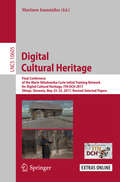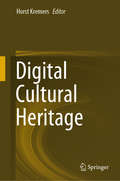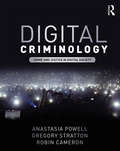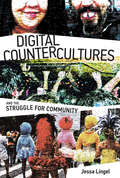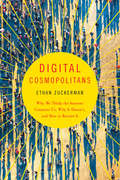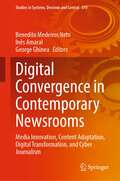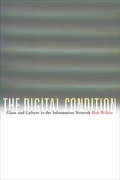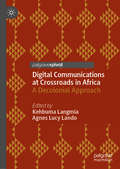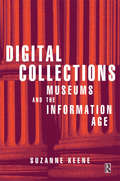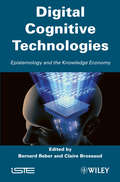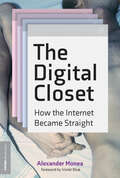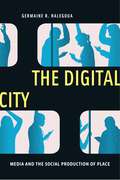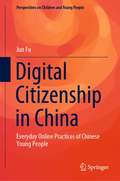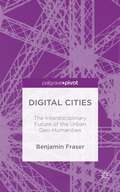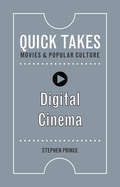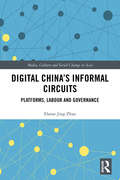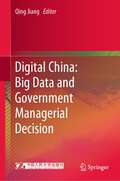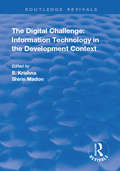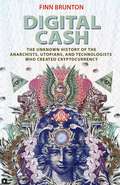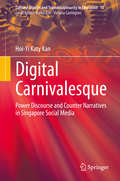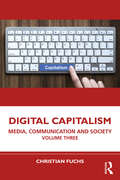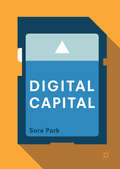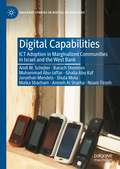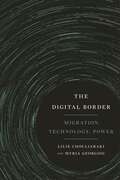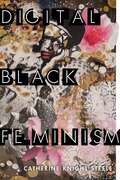- Table View
- List View
Digital Cultural Heritage: Progress In Cultural Heritage. Documentation, Preservation, And Protection5th International Conference, Euromed 2014, Limassol, Cyprus, November 3-8, 2014, Proceedings (Theoretical Computer Science and General Issues #8740)
by Marinos IoannidesThis book constitutes the refereed post-conference proceedings of the Final Conference of the Marie Skłodowska-Curie Initial Training Network for Digital Cultural Heritage, held in Olimje, Slovenia, in May 2017.The 29 revised full papers included in this volume were carefully reviewed and selected from 198 submissions. They focus on interdisciplinary and multi-disciplinary research concerning cutting edge cultural heritage informatics, -physics, -chemistry and -engineering and the use of technology for the representation, documentation, archiving, protection, preservation and communication of cultural heritage knowledge.
Digital Cultural Heritage
by Horst KremersThis book provides an overview of various application spheres and supports further innovations needed in information management and in the processes of knowledge generation. The professions, organizations and scientific associations involved are unusually challenged by the complexity of the data situation. Cartography has always been the central field of application for georeferencing digital cultural heritage (DCH) objects. It is particularly important in enabling spatial relation analysis between any number of DCH objects or of their granular details. In addition to the pure geometric aspects, the cognitive relations that lead to knowledge representation and derivation of innovative use processes are also of increasing importance. Further, there is a societal demand for spatial reference and analytics (e.g. the extensive use of cognitive concepts of "map" and "atlas" for a variety of social topics in the media). There is a huge geometrical-logical-cognitive potential for complex, multimedia, digital-cultural-heritage databases and stakeholders expect handling, transmission and processing operations with guaranteed long-term availability for all other stakeholders. In the future, whole areas of digital multimedia databases will need to be processed to further our understanding of historical and cultural contexts. This is an important concern for the information society and presents significant challenges for cartography in all these domains.This book collects innovative technical and scientific work on the entire process of object digitization, including detail extraction, archiving and interoperability of multimedia DCH data.
Digital Criminology: Crime and Justice in Digital Society
by Anastasia Powell Gregory Stratton Robin CameronThe infusion of digital technology into contemporary society has had significant effects for everyday life and for everyday crimes. Digital Criminology: Crime and Justice in Digital Society is the first interdisciplinary scholarly investigation extending beyond traditional topics of cybercrime, policing and the law to consider the implications of digital society for public engagement with crime and justice movements. This book seeks to connect the disparate fields of criminology, sociology, legal studies, politics, media and cultural studies in the study of crime and justice. Drawing together intersecting conceptual frameworks, Digital Criminology examines conceptual, legal, political and cultural framings of crime, formal justice responses and informal citizen-led justice movements in our increasingly connected global and digital society. Building on case study examples from across Australia, Canada, Europe, China, the UK and the United States, Digital Criminology explores key questions including: What are the implications of an increasingly digital society for crime and justice? What effects will emergent technologies have for how we respond to crime and participate in crime debates? What will be the foundational shifts in criminological research and frameworks for understanding crime and justice in this technologically mediated context? What does it mean to be a ‘just’ digital citizen? How will digital communications and social networks enable new forms of justice and justice movements? Ultimately, the book advances the case for an emerging digital criminology: extending the practical and conceptual analyses of ‘cyber’ or ‘e’ crime beyond a focus foremost on the novelty, pathology and illegality of technology-enabled crimes, to understandings of online crime as inherently social.
Digital Countercultures and the Struggle for Community: Digital Technologies And The Struggle For Community (The Information Society Series)
by Jessa LingelHow countercultural communities have made the Internet meet their needs, subverting established norms of digital technology use.Whether by accidental keystroke or deliberate tinkering, technology is often used in ways that are unintended and unimagined by its designers and inventors. In this book, Jessa Lingel offers an account of digital technology use that looks beyond Silicon Valley and college dropouts-turned-entrepreneurs. Instead, Lingel tells stories from the margins of countercultural communities that have made the Internet meet their needs, subverting established norms of how digital technologies should be used. Lingel presents three case studies that contrast the imagined uses of the web to its lived and often messy practicalities. She examines a social media platform (developed long before Facebook) for body modification enthusiasts, with early web experiments in blogging, community, wikis, online dating, and podcasts; a network of communication technologies (both analog and digital) developed by a local community of punk rockers to manage information about underground shows; and the use of Facebook and Instagram for both promotional and community purposes by Brooklyn drag queens. Drawing on years of fieldwork, Lingel explores issues of alterity and community, inclusivity and exclusivity, secrecy and surveillance, and anonymity and self-promotion. By examining online life in terms of countercultural communities, Lingel argues that looking at outsider experiences helps us to imagine new uses and possibilities for the tools and platforms we use in everyday life.
Digital Cosmopolitans: Why We Think the Internet Connects Us, Why It Doesn't, and How to Rewire It
by Ethan Zuckerman"One of our most important books on globalization." --Steve O'Keefe, New York Journal of Books The enormous scope of the Internet can lead us to assume that as the online community grows, our world grows smaller and more cosmopolitan. In Digital Cosmopolitans, Ethan Zuckerman explains why the technological ability to communicate with someone does not guarantee human interaction or the healthy exchange of information and ideas. Combining the latest psychological and sociological research with current trends both online and off, Digital Cosmopolitans highlights the challenges we face and the headway being made in creating a world that is truly connected.
Digital Convergence in Contemporary Newsrooms: Media Innovation, Content Adaptation, Digital Transformation, and Cyber Journalism (Studies in Systems, Decision and Control #370)
by Benedito Medeiros Neto Inês Amaral George GhineaThis book explores the dynamic landscape in contemporary newsrooms across three continents by investigating the impact that the processes of searching, processing, and distributing data and information and the use of big data, with secure, automatic, and agile retrieval of information all have in this context. Journalistic organizations have undergone digital transformations, and only those implementing accurate transformations survive. In so doing, the book addresses the fields of e-Communication, Computer Science, and Information Science and other areas of the authors’ expertise. The first five chapters focus on technical visits to investigate newsrooms’ productive routines and flows in major dailies from Brazil, Costa Rica, and England. The remaining chapters consider that the news production routines are cooperative and distributed and at the same time need to be managed from different perspectives to support the convergence of digital media. Last but not least, the book also identifies an increase in ICT-based tools, with an increasing connection from new media combined with the growing trend of digital economy practices as important factors in the new landscape of digital journalism.
The Digital Condition: Class and Culture in the Information Network
by Rob WilkieThe acceleration in science, technology, communication, and production that began in the second half of the twentieth century— developments which make up the concept of the “digital”—has brought us to what might be the most contradictory moment in human history. The digital revolution has made it possible not only to imagine but to actually realize a world in which social inequality and poverty are vanquished. But instead these developments have led to an unprecedented level of accumulation of private profits. Rather than the end of social inequality we are witness to its global expansion. Recent cultural theory tends to focus on the intricate surface effects of the emerging digital realities, proposing that technological advances effect greater cultural freedom for all, ignoring the underpinning social context. But beneath the surfaces of digital culture are complex social and historical relations that can be understood only from the perspective of a class analysis which explains why the new realities of the “digital condition" are conditioned by the actualities of global class inequalities. It is no longer the case that "technology" can take on the appearance of a simple or neutral aspect of human society. It is time for a critique of the digital times. In The Digital Condition, Rob Wilkie advances a groundbreaking analysis of digital culture which argues that the digital geist—which has its genealogy in such concepts as the “body without organs,” “spectrality,” and “différance”—has obscured the implications of class difference with the phantom of a digital divide. Engaging the writings of Hardt and Negri, Poster, Deleuze and Guattari, Derrida, Haraway, Latour, and Castells, the literature and cinema of cyberpunk, and digital commodities like the iPod, Wilkie initiates a new direction within the field of digital cultural studies by foregrounding the continuing importance of class in shaping the contemporary.
Digital Communications at Crossroads in Africa: A Decolonial Approach
by Kehbuma Langmia Agnes Lucy LandoDigital communication as it is practiced in Africa today is at a crossroad. This edited collection takes that crossroad as its starting point, as it both examines the complicated present and looks to the uncertain future of African communication systems. Contributing authors explore how western digital communication systems have proliferated in the African communication landscape, and argue that rich and long-cherished African forms of communal, in-person communication have been increasingly abandoned in favor of assimilation to western digital norms. As a result, future generations of Africans born on the continent and abroad may never recognize and appreciate African systems of communications.Acknowledging that globalized digital communication systems are here to stay, the volume contends that in order to comprehend the past, present, and future of African communications, scholars need to decolonize their approach to teaching and consuming mediated and in-person communications on the African continent and abroad.
Digital Collections
by Suzanne KeeneSuzanne Keene's pioneering book shows how museums and other cultural organizations fit into the new world of information and electronic communications and, most importantly, how they can take advantage of what it has to offer. By using new technology museums can build knowledge bases around information about collections. A collection object can be the central link for information about past and present, places, people and concepts, technologies, ways of working and evidence of the natural world. 'Digital Collections' explains how this vision can be realized. Sound, video and animations can be digitized and developed as a central resource that can be drawn on for many varied access routes: via the World Wide Web; CD ROMs; through on-gallery screens, and other future products still in development. These technological capabilities raise many compelling issues that need to be understood in order to successfully develop information collections. In this book Suzanne Keene reviews these issues clearly and comprehensively. Her accompanying Click-Through Guide provides the latest news and links to Internet information:http://www.users.dircon.co.uk/~s-keene/infoage/infoage.htmSuzanne Keene is a senior manager of museum collections and information at the Science Museum, London. She led the UK LASSI project to select a collections information system for UK museums. This, with her experience in directing information technology and multimedia projects, means that she is accustomed to translating the highly technical concepts of information technology into high level issues for senior and strategic management.
Digital Cognitive Technologies: Epistemology and Knowledge Society
by Bernard Reber Claire BrossaudDigital Cognitive Technologies is an interdisciplinary book which assesses the socio-technical stakes of Information and Communication Technologies (ICTs), which are at the core of the ?Knowledge Society.? This book addresses eight major issues, analyzed by authors writing from a Human and Social Science and a Science and Technology perspective. The contributions seek to explore whether and how ICTs are changing our perception of time, space, social structures and networks, document writing and dissemination, sense-making and interpretation, cooperation, politics, and the dynamics of collective activity (socio-informatics).
The Digital Closet: How the Internet Became Straight (Strong Ideas)
by Alexander MoneaAn exploration of how heteronormative bias is deeply embedded in the internet, hidden in algorithms, keywords, content moderation, and more.In The Digital Closet, Alexander Monea argues provocatively that the internet became straight by suppressing everything that is not, forcing LGBTQIA+ content into increasingly narrow channels—rendering it invisible through opaque algorithms, automated and human content moderation, warped keywords, and other strategies of digital overreach. Monea explains how the United States&’ thirty-year &“war on porn&” has brought about the over-regulation of sexual content, which, in turn, has resulted in the censorship of much nonpornographic content—including material on sex education and LGBTQIA+ activism. In this wide-ranging, enlightening account, Monea examines the cultural, technological, and political conditions that put LGBTQIA+ content into the closet.Monea looks at the anti-porn activism of the alt-right, Christian conservatives, and anti-porn feminists, who became strange bedfellows in the politics of pornography; investigates the coders, code, and moderators whose work serves to reify heteronormativity; and explores the collateral damage in the ongoing war on porn—the censorship of LGBTQ+ community resources, sex education materials, art, literature, and other content that engages with sexuality but would rarely be categorized as pornography by today&’s community standards. Finally, he examines the internet architectures responsible for the heteronormalization of porn: Google Safe Search and the data structures of tube sites and other porn platforms. Monea reveals the porn industry&’s deepest, darkest secret: porn is boring. Mainstream porn is stuck in a heteronormative filter bubble, limited to the same heteronormative tropes, tagged by the same heteronormative keywords. This heteronormativity is mirrored by the algorithms meant to filter pornographic content, increasingly filtering out all LGBTQIA+ content. Everyone suffers from this forced heteronormativity of the internet—suffering, Monea suggests, that could be alleviated by queering straightness and introducing feminism to dissipate the misogyny.
The Digital City: Media and the Social Production of Place (Critical Cultural Communication #4)
by Germaine R. HalegouaShows how digital media connects people to their lived environments Every day, millions of people turn to small handheld screens to search for their destinations and to seek recommendations for places to visit. They may share texts or images of themselves and these places en route or after their journey is complete. We don’t consciously reflect on these activities and probably don’t associate these practices with constructing a sense of place. Critics have argued that digital media alienates users from space and place, but this book argues that the exact opposite is true: that we habitually use digital technologies to re-embed ourselves within urban environments. The Digital City advocates for the need to rethink our everyday interactions with digital infrastructures, navigation technologies, and social media as we move through the world. Drawing on five case studies from global and mid-sized cities to illustrate the concept of “re-placeing,” Germaine R. Halegoua shows how different populations employ urban broadband networks, social and locative media platforms, digital navigation, smart cities, and creative placemaking initiatives to turn urban spaces into places with deep meanings and emotional attachments. Through timely narratives of everyday urban life, Halegoua argues that people use digital media to create a unique sense of place within rapidly changing urban environments and that a sense of place is integral to understanding contemporary relationships with digital media.
Digital Citizenship in China: Everyday Online Practices of Chinese Young People (Perspectives on Children and Young People #12)
by Jun FuThis book examines how emerging forms of citizenship are shaped by young people in digital spaces as way of making sense of contemporary Chinese society, forming new identities, and negotiating social and political participation. By focusing on Chinese young adults' everyday online practices, the book offers a unique treatment of the topic of young people and the Chinese Internet that navigates between the dominant focus on censorship on the one hand and protest and politicized action on the other. The book brings the focus of research from highly visible or spectacular forms of collectivity, belonging, and identification exhibited in young people's online practices to young people's everyday social and cultural engagement through new media. It brings new insights by understanding the meanings of young people's mundane and everyday online engagement for their citizenship learning, identity performance, and their formation of political subjectivity. Readers will gain insights into citizenship in China, and young people and the Chinese Internet.
Digital Cities: The Interdisciplinary Future of the Urban Geo-Humanities
by Benjamin FraserDigital Cities stakes claim to an interdisciplinary terrain where the humanities and social sciences combine with digital methods. Part I: Layers of the Interdisciplinary City converts a century of urban thinking into concise insights destined for digital application. Part II: Disciplinary/Digital Debates and the Urban Phenomenon delves into the bumpy history and uneven present landscape of interdisciplinary collaboration as they relate to digital urban projects. Part III: Toward a Theory of Digital Cities harnesses Henri Lefebvre's capacious urban thinking and articulation of urban 'levels' to showcase where 'deep maps' and 'thick mapping' might take us. Benjamin Fraser argues that while disciplinary frictions still condition the potential of digital projects, the nature of the urban phenomenon pushes us toward an interdisciplinary and digital future where the primacy of cities is assured.
Digital Cinema: The Seduction Of Reality (Quick Takes: Movies and Popular Culture)
by Stephen PrinceDigital Cinema considers how new technologies have revolutionized the medium, while investigating the continuities that might remain from filmmaking’s analog era. In the process, it raises provocative questions about the status of realism in a pixel-generated digital medium whose scenes often defy the laws of physics. It also considers what these changes might bode for the future of cinema. How will digital works be preserved and shared? And will the emergence of virtual reality finally consign cinema to obsolescence? Stephen Prince offers a clear, concise account of how digital cinema both extends longstanding traditions of filmmaking and challenges some fundamental assumptions about film. It is essential reading for anyone interested in understanding how movies are shot, produced, distributed, and consumed in the twenty-first century.
Digital China's Informal Circuits: Platforms, Labour and Governance (Media, Culture and Social Change in Asia)
by Elaine Jing ZhaoFrom open source cultures, piracy, to amateur media and on-demand labour, informal media activities are vibrant in circuits of cultural production, distribution, consumption and labour utilisation in China. They come in different sizes and shapes, involve multiple actors, often with transnational ties and tensions, and challenge polemic views. Why do these informal activities occur, and how do they evolve? What cultural and social consequences do they have? In what ways do they pose challenges to governance and provoke us to rethink the notion? This book engages with diverse forms of the informal and their equally diverse interactions with the formal in the broader context of the rise of digital platforms, the contingent and complicated state–market interactions, and evolving roles of users. The book provides a vivid and original account of how digital platforms navigate formal and informal boundaries at both operational and discursive levels; how enthusiastic fans, aspiring amateurs, 'ordinary' users and necessity-driven labourers become integral to the formal/informal interface; and how state and non-state actors intervene in governing the formal/informal dynamics. In doing so, the book opens up new insights into the ongoing digital transformation in China.
Digital China: Big Data and Government Managerial Decision
by Qing JiangThis book is the first practical case study on the application of big data in China's government management scenarios, which is important for comprehensively presenting the achievements of China's e-government and digital construction as well as deeply understanding the implementation of big data strategy in China.The author of this book is one of the earliest practitioners engaged in the study of big data applications, and has personally experienced the development, major events, application cases, and industry changes of big data in China. Cases in this book are all actual projects carried out. The author of this book explains the development history of big data she has personally experienced, presenting in an easy-to-understand way the basic concept and characteristics of big data and practical interpretation, which provides important reference for the practical work of government and enterprise managers. The application ideas of big data in management innovation are proposed, and scenarios are described and discussed in terms of accelerating research on sharing big data in government affairs, breaking barriers, realizing data flow information sharing, creating one-stop services, improving the corresponding policy system for sharing big data in government affairs, building public information platform for e-government, and strengthening network and information infrastructure.Especially for the government personnel in departments, this book will give them a better understanding of the charm and value of big data, intuitively understand the utilization and analysis of big data, carry out effective government management and make correct decisions, so as to improve the data literacy of organizations and individuals, form scientific support for their own government's decision-making and management, thus promote the continued construction of digital government, digital China, and digital economy era based on the application of big data.
The Digital Challenge: Information Technology in the Development Context (Routledge Revivals Ser.)
by Shirin Madon S. KrishnaThis title was first published in 2003. Information and communication technologies (ICTs) are increasingly being recognized as vital to the economic growth and global inclusion and participation of developing countries. This book brings together both academics and practitioners to provide a comprehensive and insightful overview of ICT and development around the world. It examines the role of IT in providing new economic and industrial opportunities, in increasing access to global information and communication, in assisting small cultural and ethnic groups to overcome disadvantages of physical distance and in catalysing initiatives towards democratic decentralization and empowerment of citizens. It also critically appraises major problems such as inappropriate focus and resource allocation, and of missed opportunities. By combining comparative case studies from Africa, South and East Asia, South America and Eastern Europe with theoretical analysis, this volume synthesizes a range of issues related to the evident tensions that exist for developing countries as they try to balance global and local priorities through the adoption and use of ICTs.
Digital Cash: The Unknown History of the Anarchists, Utopians, and Technologists Who Created Cryptocurrency
by Finn BruntonThe fascinating untold story of digital cash and its creators—from experiments in the 1970s to the mania over Bitcoin and other cryptocurrenciesBitcoin may appear to be a revolutionary form of digital cash without precedent or prehistory. In fact, it is only the best-known recent experiment in a long line of similar efforts going back to the 1970s. But the story behind cryptocurrencies like Bitcoin and its blockchain technology has largely been untold—until now. In Digital Cash, Finn Brunton reveals how technological utopians and political radicals created experimental money to bring about their visions of the future: protecting privacy or bringing down governments, preparing for apocalypse or launching a civilization of innovation and abundance that would make its creators immortal.The incredible story of the pioneers of cryptocurrency takes us from autonomous zones on the high seas to the world’s most valuable dump, from bank runs to idea coupons, from time travelers in a San Francisco bar to the pattern securing every twenty-dollar bill, and from marketplaces for dangerous secrets to a tank of frozen heads awaiting revival in the far future. Along the way, Digital Cash explores the hard questions and challenges that these innovators faced: How do we learn to trust and use different kinds of money? What makes digital objects valuable? How does currency prove itself as real to us? What would it take to make a digital equivalent to cash, something that could be created but not forged, exchanged but not copied, and which reveals nothing about its users?Filled with marvelous characters, stories, and ideas, Digital Cash is an engaging and accessible account of the strange origins and remarkable technologies behind today’s cryptocurrency explosion.
Digital Carnivalesque: Power Discourse and Counter Narratives in Singapore Social Media (Cultural Studies and Transdisciplinarity in Education #10)
by Hoi-Yi Katy KanThis book challenges the framing of comedic acts as apolitical and it adopts a multimodal critical discourse approach to interrogate the performance of comedy as a form of power. It proposes using Bakhtin’s carnivalesque as the analytic tool to distil for readers key differences between humour as banal and humour as critical (and political) in today’s social media. Drawing from critical theory and cultural studies, this book takes an interdisciplinary approach in formulating a contemporary view of power that reflects social realities not only in the digital economy but also in a world that is increasingly authoritarian. With the proposition of newer theoretical lenses in this book, scholars and social scientists can then find a way to shift the conversation to uncover the evolving voices of (existing and newer) power holders in the shared digital space; and to view current social realities as a continual project in unpacking and understanding the adaptive ways of the human spirit.
Digital Capitalism: Media, Communication and Society Volume Three (Critical, Digital And Social Media Studies)
by Christian FuchsThis third volume in Christian Fuchs’s Media, Communication and Society book series illuminates what it means to live in an age of digital capitalism, analysing its various aspects, and engaging with a variety of critical thinkers whose theories and approaches enable a critical understanding of digital capitalism for media and communication. Each chapter focuses on a particular dimension of digital capitalism or a critical theorist whose work helps us to illuminate how digital capitalism works. Subjects covered include: digital positivism; administrative big data analytics; the role and relations of patriarchy, slavery, and racism in the context of digital labour; digital alienation; the role of social media in the capitalist crisis; the relationship between imperialism and digital labour; alternatives such as trade unions and class struggles in the digital age; platform co-operatives; digital commons; and public service Internet platforms. It also considers specific examples, including the digital labour of Foxconn and Pegatron workers, software engineers at Google, and online freelancers, as well as considering the political economy of targeted-advertising-based Internet platforms such as Facebook, Google, YouTube, and Instagram. Digital Capitalism illuminates how a digital capitalist society’s economy, politics, and culture work and interact, making it essential reading for both students and researchers in media, culture, and communication studies, as well as related disciplines.
Digital Capital
by Sora ParkThis book describes and understands the many factors that influence a person's behavior towards digital technologies, and how that affects the person's potential to benefit from digital society. The ability to adapt to these new technological environments - and the extent to which an individual embraces them - has become critical to an individual's well-being and quality of life, the underlying assumption being that only by effectively engaging with digital technologies can the user accrue benefits from the experience. By introducing the concept "digital capital," which refers to the conditions that determine how people access, use, and engage with digital technology, Park examines how the digital ecosystem of the user lead to new forms of digital inequality. Using numerous empirical studies on internet users and non-users, as well as recommending small localized solutions to the big global problem, a critical and alternative perspective of the digital divide is provided.
Digital Capabilities: ICT Adoption in Marginalized Communities in Israel and the West Bank (Palgrave Studies in Digital Inequalities)
by Amit Schejter Baruch Shomron Muhammad Abu Jafar Ghalia Abu Kaf Jonathan Mendels Shula Mola Malka Shacham Amneh Al Sharha Noam TiroshDigital Capabilities is a first-of-its-kind exploration of the capabilities that communities in positions of inequality in Israel and the West Bank seek to realize by utilizing information and communication technologies (ICT), the opportunities they have to communicate, and the way ICTs serve their desire to do so. It is the outcome of an eight-year research project in which the nine authors of this book, some of whom came from within the studied communities, conducted their work among the studied populations over an extended period of time. The capabilities approach, much discussed theoretically, takes on a life in this project and is presented as an empirically observable phenomenon for assessing whether ICTs are serving actual needs, whether communication resources are justly allocated and distributed and whether they serve the goal of a universally accessible right to communicate.
The Digital Border: Migration, Technology, Power (Critical Cultural Communication)
by Lilie Chouliaraki Myria GeorgiouHow do digital technologies shape the experiences and meanings of migration?As the numbers of people fleeing war, poverty, and environmental disaster reach unprecedented levels worldwide, states also step up their mechanisms of border control. In this, they rely on digital technologies, big data, artificial intelligence, social media platforms, and institutional journalism to manage not only the flow of people at crossing-points, but also the flow of stories and images of human mobility that circulate among their publics. What is the role of digital technologies is shaping migration today? How do digital infrastructures, platforms, and institutions control the flow of people at the border? And how do they also control the public narratives of migration as a “crisis”? Finally, how do migrants themselves use these same platforms to speak back and make themselves heard in the face of hardship and hostility? Taking their case studies from the biggest migration event of the twenty-first century in the West, the 2015 European migration “crisis” and its aftermath up to 2020, Lilie Chouliaraki and Myria Georgiou offer a holistic account of the digital border as an expansive assemblage of technological infrastructures (from surveillance cameras to smartphones) and media imaginaries (stories, images, social media posts) to tell the story of migration as it unfolds in Europe’s outer islands as much as its most vibrant cities. This is a story of exclusion, marginalization, and violence, but also of care, conviviality, and solidarity. Through it, the border emerges neither as strictly digital nor as totally controlling. Rather, the authors argue, the digital border is both digital and pre-digital; datafied and embodied; automated and self-reflexive; undercut by competing emotions, desires, and judgments; and traversed by fluid and fragile social relationships—relationships that entail both the despair of inhumanity and the promise of a better future.
Digital Black Feminism (Critical Cultural Communication)
by Catherine Knight SteeleTraces the longstanding relationship between technology and Black feminist thoughtBlack women are at the forefront of some of this century’s most important discussions about technology: trolling, online harassment, algorithmic bias, and influencer culture. But, Catherine Knight Steele argues that Black women’s relationship to technology began long before the advent of Twitter or Instagram. To truly “listen to Black women,” Steele points to the history of Black feminist technoculture in the United States and its ability to decenter white supremacy and patriarchy in a conversation about the future of technology. Using the virtual beauty shop as a metaphor, Digital Black Feminism walks readers through the technical skill, communicative expertise, and entrepreneurial acumen of Black women’s labor—born of survival strategies and economic necessity—both on and offline.Positioning Black women at the center of our discourse about the past, present, and future of technology, Steele offers a through-line from the writing of early twentieth-century Black women to the bloggers and social media mavens of the twenty-first century. She makes connections among the letters, news articles, and essays of Black feminist writers of the past and a digital archive of blog posts, tweets, and Instagram stories of some of the most well-known Black feminist writers of our time. Linking narratives and existing literature about Black women’s technology use in the nineteenth, twentieth, and twenty-first century, Digital Black Feminism traverses the bounds between historical and archival analysis and empirical internet studies, forcing a reconciliation between fields and methods that are not always in conversation. As the work of Black feminist writers now reaches its widest audience online, Steele offers both hopefulness and caution on the implications of Black feminism becoming a digital product.
